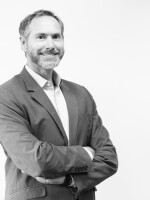Earlier this summer, three dozen cyclists huddle together at a ranch between Ketchum and Mackay. They range from newcomers to pros, and they’ve come to Idaho from as far as Singapore, Hawaii and the Netherlands.
Rebecca Rusch speaks to them in front of a giant stone fireplace under a stuffed buffalo head, plotting the route for the next day.
"We’re going to do a big ride tomorrow," says Rusch. "And kind of wrap your head around that tonight when you go to bed and get all stoked about it and be like, yeah, I’m so lucky. I get to be on my bike for about six or seven hours tomorrow. Hell yes!"
She starts with an apology about tomorrow’s plan. Not for the 4,300 feet of climbing, but for how the day begins.
"We have six miles or so of pavement. I apologize. That’s the only other pavement you’re going to see for the rest of this time."
These athletes didn’t come to Central Idaho for paved roads. And they didn’t come for mountain bike single-track. They’re here for long dirt roads.
This is gravel biking, a new trend in endurance sports and Rusch is at the center of it. She’s here leading a training camp, teaching bike skills and how to use GPS cycling maps on hard-to-find trails.

The 50-year-old Ketchum resident spent decades as a competitive rock climber, adventure racer and mountain bike champion. Next month she’ll be elected into the Mountain Bike Hall Of Fame.
Rusch says, "You know going and winning mountain bike races doesn’t pay the mortgage in Ketchum, Idaho." But she is constantly reinventing her relationship with sports.
She is the host of Rebecca’s Private Idaho, several days of gravel racing in the Wood River Valley over Labor Day weekend. This year Outside magazine listed it one of the top 25 cycling events in the world.
"Yeah I’ve had to hustle," says Rusch. "I’ve had to make it work. But now, we’ve built Private Idaho in just seven years, we’re going on seven years. It’s now the biggest sporting event in the Wood River Valley, as far as economic impact."
Harry Griffith, Executive Director for Sun Valley Economic Development, explains that "it’s in the order of some 3 to 4 million dollars impact per year. It’s not just about the people that are here. It’s the fact that the people that come here, come back."
Part of the attraction for this “Private Idaho” is the state’s vast public lands, and spending hours bike-packng on remote gravel roads.
This Labor Day weekend, Ketchum comes alive with Wagon Days, a real slice of Americana, with mule-drawn covered wagons rolling down the streets. But visitors may also see the 1,200 riders expected for the multi-day event.

Mechanic Andi Zolton is working on Rusch’s bike. Like a mountain bike, a gravel bike has wide, lower-pressure tires and disc brakes, but with drop handlebars like a road bike.
Because of the distances they’re ridden, it has lots of storage. She digs through the bag to find a wind breaker, leg warmers, a buff and lots of Gu food items.
Gravel grinders like Rusch will go on epic rides self-supported. This spring she became the first to bike a new 1,000-mile path across Arkansas. Her 1,200-mile trip down the Ho Chi Minh Trail in Vietnam and Laos was made into a 2017 documentary film called Blood Road.
Wilderness adventure and bike-packing is what draws many to the sport. And it’s what gravel bikes are built to do.
"It's just a versatile machine," says Jason Bauer, a retailer in Boise. "Kind of perfect for the Idaho back roads and fire roads and just linking together little towns."
He admits he hasn’t sold many “true” road bikes lately. "The road racing scene and the mountain biking scene has faded a bit."
According to the Bicycle Product Suppliers Association, the number of bikes sold overall fell 10% last year, but e-bikes and gravel bikes were among the categories showing growth.
Amy Trosclair is here to race every day at Rebecca’s Private Idaho. She rides on pavement back in her native Louisiana, but she’ll still drive two hours from her house to find gravel, "because it takes you places you never see on the road. It took me here to Idaho, which I absolutely love. And you don’t have cars, or traffic. Several of my cycling friends have been hit."
Rider safety is another reason for the decline of road racing. She describes a fatality of a prominent rider near home. The motorist was not charged. The town turned against cyclists. Distracted driving, she says, is growing.

Bart Davis, one of the race officials, shares that concern.
"I ended up in 2008 being hit by a car by training for a triathlon on my bike. And I hung it up."
Gravel biking eventually brought him back to cycling. It’s more accessible and races like these are growing to capacity.
Driving up Trail Creek Summit after a day spinning through the Copper Basin at Rusch Academy, Davis is trying to recall the last time he rode this long. It was since that crash.
"It felt great," he says. "And the views that we had today were spectacular. It was amazing up there."
Rebecca Rusch calls this “nature therapy” and understands the appeal of getting out of cellphone range. Beyond the physical challenges of this weekend, she points out the spiritual contradictions. Deciding what to carry and what to leave behind. Riding with others in order to be alone. And getting off-the-grid to find yourself.
Find Tom Michael on Twitter @Tom2Michael
Copyright 2019 Boise State Public Radio




